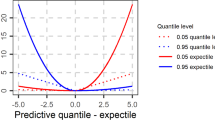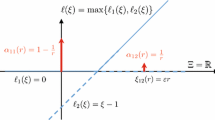Abstract
We establish sharp asymptotically optimal strategies for the problem of online prediction with history dependent experts. The prediction problem is played (in part) over a discrete graph called the d dimensional de Bruijn graph, where d is the number of days of history used by the experts. Previous work Drenska and Kohn (arXiv:2007.12732, 2020) established \(O(\varepsilon )\) optimal strategies for \(n=2\) experts and \(d\le 4\) days of history, while Drenska and Kohn (J Nonlinear Sci 30. 30(1), 137–173, 2020) established \(O(\varepsilon ^{1/3})\) optimal strategies for all \(n\ge 2\) and all \(d\ge 1\), where the game is played for N steps and \(\varepsilon =N^{-1/2}\). In this paper, we show that the optimality conditions over the de Bruijn graph correspond to a graph Poisson equation, and we establish \(O(\varepsilon )\) optimal strategies for all values of n and d.

Similar content being viewed by others
References
Amin, K., Kale, S., Tesauro, G., Turaga, D.: Budgeted prediction with expert advice. In: Twenty-Ninth AAAI Conference on Artificial Intelligence (2015)
Antunovic, T., Peres, Y., Sheffield, S., Somersille, S.: Tug-of-war and infinity Laplace equation with vanishing Neumann boundary condition. Commun. Partial Differ. Equ. 37(10), 1839–1869 (2012)
Armstrong, S.N., Smart, C.K.: A finite difference approach to the infinity Laplace equation and tug-of-war games. Trans. Am. Math. Soc. 364(2), 595–636 (2012)
Bayraktar, E., Ekren, I., Zhang, Y.: On the asymptotic optimality of the comb strategy for prediction with expert advice. Ann. Appl. Probab. (2020)
Calder, J., Smart, C.K.: The limit shape of convex hull peeling. Duke Math. J. 169(11), 2079–2124 (2020)
Cesa-Bianchi, N., Freund, Y., Haussler, D., Helmbold, D.P., Schapire, R.E., Warmuth, M.K.: How to use expert advice. J. ACM 44(3), 427–485 (1997)
Cesa-Bianchi, N., Lugosi, G.: Prediction, Learning, and Games. Cambridge University Press, New York (2006)
Cover, T.M.: Behavior of sequential predictors of binary sequences. Technical report, Stanford University California Stanford Electronics Labs (1966)
Drenska, N.: A PDE Approach to a Prediction Problem Involving Randomized Strategies. PhD thesis, New York University, New York (2017)
Drenska, N., Calder, J.: Online prediction with history-dependent experts: the general case. arXiv:2008.00052 (2020)
Drenska, N., Kohn, R.V.: A PDE approach to the prediction of a binary sequence with advice from two history-dependent experts. arXiv:2007.12732 (2020)
Drenska, N., Kohn, R.V.: Prediction with expert advice: a PDE perspective. J. Nonlinear Sci. 30(1), 137–173 (2020)
Freund, Y., Schapire, R.E.: A decision-theoretic generalization of on-line learning and an application to boosting. J. Comput. Syst. Sci. 55(1), 119–139 (1997)
Gravin, N., Peres, Y., Sivan, B.: Towards optimal algorithms for prediction with expert advice. In: Proceedings of the Twenty-Seventh Annual ACM-SIAM Symposium on Discrete Algorithms, SODA ’16, pp. 528–547, Philadelphia, PA, USA (2016). Society for Industrial and Applied Mathematics
Hannan, J.: Approximation to Bayes risk in repeated play. Contrib. Theory Games 3, 97–139 (1957)
Haussler, D., Kivinen, J., Warmuth, M.K.: Tight worst-case loss bounds for predicting with expert advice. In: European Conference on Computational Learning Theory, pp. 69–83. Springer, Berlin (1995)
Kobzar, V.A., Kohn, R.V., Wang, Z.: New potential-based bounds for prediction with expert advice. In: Conference on Learning Theory, pp. 2370–2405. PMLR (2020)
Kobzar, V.A., Kohn, R.V., Wang, Z.: New potential-based bounds for the geometric-stopping version of prediction with expert advice. In: Mathematical and Scientific Machine Learning, pp. 537–554. PMLR (2020)
Kohn, R.V., Serfaty, S.: A deterministic-control-based approach motion by curvature. Commun. Pure Appl. Math. 59(3), 344–407 (2006)
Kohn, R.V., Serfaty, S.: A deterministic-control-based approach to fully nonlinear parabolic and elliptic equations. Commun. Pure Appl. Math. 63(10), 1298–1350 (2010)
Lewicka, M., Manfredi, J.J.: The obstacle problem for the p-Laplacian via optimal stopping of tug-of-war games. In: Probability Theory and Related Fields, pp. 1–30 (2015)
Littlestone, N., Warmuth, M.K.: The weighted majority algorithm. Inf. Comput. 108(2), 212–261 (1994)
Naor, A., Sheffield, S.: Absolutely minimal Lipschitz extension of tree-valued mappings. Math. Ann. 354(3), 1049–1078 (2012)
Peres, Y., Schramm, O., Sheffield, S., Wilson, D.B.: Tug-of-war and the infinity Laplacian. J. Am. Math. Soc. 22(1), 167–210 (2009)
Peres, Y., Sheffield, S.: Tug-of-war with noise: a game-theoretic view of the \(p\)-Laplacian. Duke Math. J. 145(1), 91–120 (2008)
Rokhlin, D.: PDE approach to the problem of online prediction with expert advice: a construction of potential-based strategies. Int. J. Pure Appl. Math. 114, 05 (2017)
Yadkori, Y.A., Bartlett, P.L., Gabillon, : Near minimax optimal players for the finite-time 3-expert prediction problem. In: Advances in Neural Information Processing Systems, pp. 3033–3042 (2017)
Zhu, K.: Two problems in applications of PDE. http://pqdtopen.proquest.com/pubnum/3635320.html (2014)
Author information
Authors and Affiliations
Corresponding author
Additional information
Publisher's Note
Springer Nature remains neutral with regard to jurisdictional claims in published maps and institutional affiliations.
Funding Jeff Calder was supported by NSF-DMS Grant 1944925 and the Alfred P. Sloan foundation.
Rights and permissions
About this article
Cite this article
Calder, J., Drenska, N. Asymptotically Optimal Strategies for Online Prediction with History-Dependent Experts. J Fourier Anal Appl 27, 20 (2021). https://doi.org/10.1007/s00041-021-09815-4
Received:
Accepted:
Published:
DOI: https://doi.org/10.1007/s00041-021-09815-4




